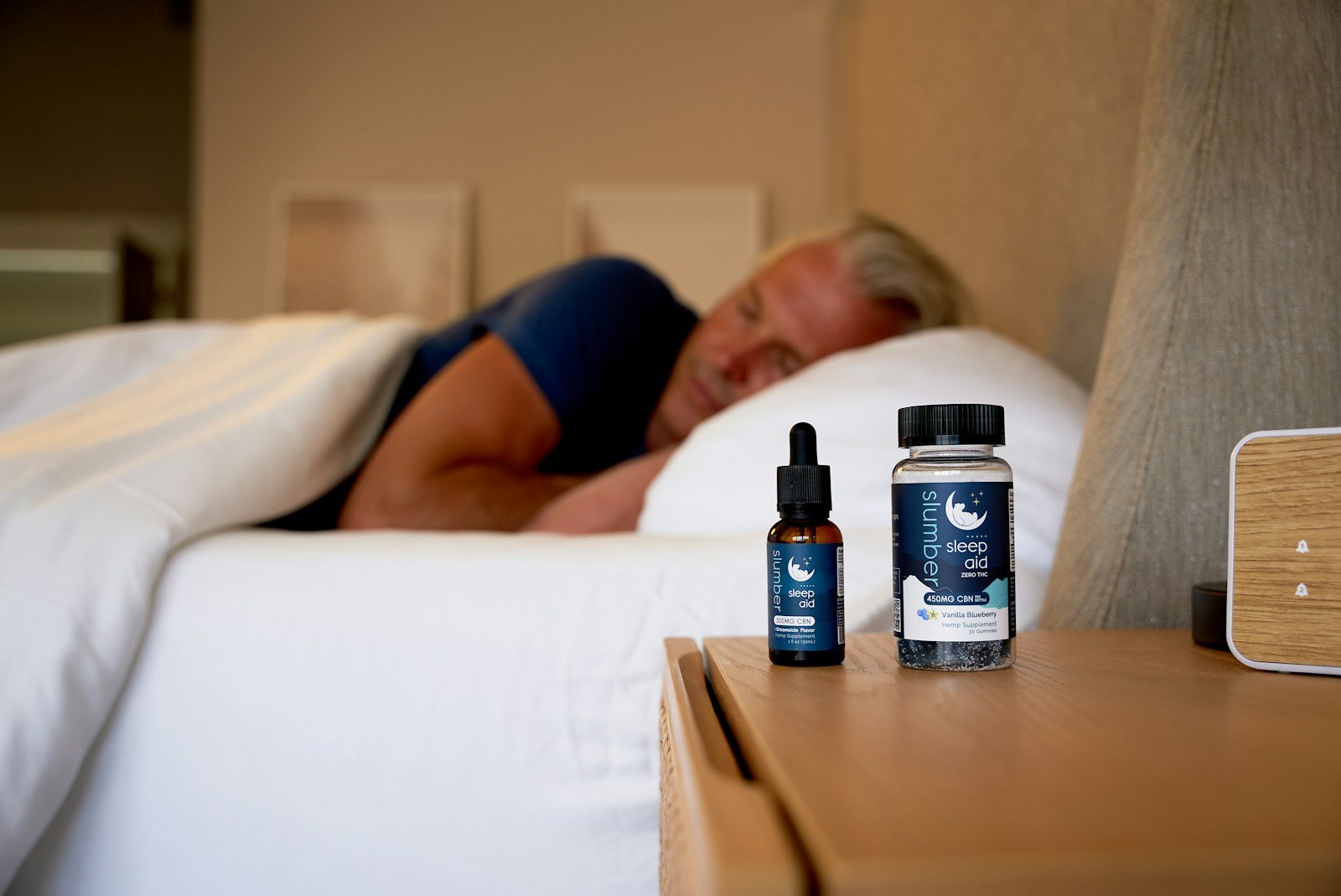How to Improve Sleep Quality with Natural Remedies
Sleep deprivation can affect your daily life, leaving you feeling fatigued and unfocused. Fortunately, you have the power to enhance your sleep quality through natural remedies that promote relaxation and calmness. In this guide, you’ll discover practical tips and effective techniques that harness the benefits of nature to help you achieve restorative sleep. Let’s explore ways to create a soothing bedtime routine, modify your environment, and incorporate natural ingredients that can transform your nights into peaceful, rejuvenating experiences.
Key Takeaways:
- Incorporate relaxation techniques such as meditation, deep breathing, or gentle yoga before bedtime to promote a calm mind and body.
- Create a sleep-conducive environment by optimizing room temperature, reducing noise, and using blackout curtains to block out light.
- Consider herbal remedies like valerian root, chamomile tea, or lavender to help induce relaxation and improve sleep quality.
- Establish a consistent sleep schedule by going to bed and waking up at the same time each day to regulate your body’s internal clock.
- Limit screen time before bed by reducing exposure to blue light from devices, which can interfere with melatonin production and disrupt sleep patterns.
The Science of Sleep: What Makes It Restorative
Understanding the mechanisms of sleep reveals why it is so crucial for overall health. Sleep is not merely a period of inactivity; it is a highly organized process that enables your body to repair itself and your brain to rejuvenate. During the various stages of sleep, particularly REM (Rapid Eye Movement) and deep sleep, critical bodily functions such as tissue growth, muscle repair, and hormone regulation occur. This restorative phase allows your immune system to strengthen and supports cognitive functions, providing a clear connection between quality sleep and your overall wellness. Studies have shown that inadequate sleep can lead to increased inflammation and disrupt metabolic health, emphasizing its role as a cornerstone of physical and mental well-being.
The Role of Sleep Cycles in Wellness
Your sleep consists of several cycles, each lasting roughly 90 minutes and comprising various stages that include light sleep, deep sleep, and REM sleep. Each of these stages serves distinct purposes; for example, deep sleep is crucial for physical recovery, while REM sleep is important for processing emotions and enhancing memory retention. Skipping any of these stages can lead to a range of negative outcomes, such as impaired cognitive function and increased stress levels. For optimal wellness, balancing these cycles ensures that your body and brain receive both the rest and rejuvenation they need.
How Environmental Factors Affect Sleep Quality
Numerous environmental factors can influence your sleep quality, creating a conducive or disruptive atmosphere for rest. Elements such as room temperature, noise levels, and light exposure play significant roles in how easily you fall asleep and how restful your sleep is. For instance, research indicates that a cooler room—ideally between 60 and 67 degrees Fahrenheit—can promote deeper sleep. On the other hand, exposure to artificial lights and noisy environments can be detrimental to your sleep cycles, leading to fragmented sleep and reduced recovery time.
- Consider minimizing ambient noise by using white noise machines or earplugs.
- Opt for blackout curtains to block disruptive light sources.
- Maintain a consistent and comfortable room temperature for optimal comfort.
The presence of clutter and general disorganization in your bedroom can also contribute to restlessness. A peaceful environment promotes relaxation and signals to your brain that it’s time to unwind. Personalizing your sleep space with calming colors, soft textures, and your favorite scents can create an inviting atmosphere conducive to quality sleep. In addition, using crucial oils such as lavender has been shown to improve sleep quality and reduce anxiety, further enhancing your ability to fall asleep quickly and enjoy a restorative night.
- Incorporate calming colors, like soft blues or greens, into your bedroom decor.
- Use aromatherapy with scents like lavender or chamomile to promote relaxation.
- Ensure your mattress and pillows provide adequate support for your preferred sleeping position.
The right environmental conditions can make a substantial difference in your sleep quality, enabling you to wake up feeling refreshed and alert rather than groggy and fatigued.
Nature’s Pharmacy: Herbs and Botanicals for Better Sleep
Chamomile and Its Calming Properties
Chamomile, often recognized for its delicate flavor and soothing aroma, has been used for centuries as a natural remedy to promote restful sleep. This herb contains apigenin, a compound that binds to specific receptors in your brain, reducing anxiety and initiating sleep. By sipping on chamomile tea before bedtime, you can harness its calming effects, which can significantly enhance your pre-sleep routine. In fact, a study found that participants who consumed chamomile tea reported better sleep quality compared to those who did not. Incorporating this simple practice into your evening ritual may pave the way for deeper, more restorative slumber.
Adding chamomile to your nighttime routine may be as simple as savoring a warm cup of tea or trying chamomile vital oil in a diffuser. The gentle aroma can create a serene bedtime environment that prepares your body for sleep. Personalizing your chamomile experience—perhaps with a drizzle of honey or a splash of lemon—can transform a mundane evening drink into a comforting ritual that signals to your mind and body that it’s time to wind down.
Valerian Root: An Ancient Solution with Modern Benefits
Valerian root has a rich history of use in various cultures, dating back to ancient Greece and Rome, where it was utilized for its sedative properties. This herb is believed to increase levels of gamma-aminobutyric acid (GABA) in your brain, a neurotransmitter that promotes relaxation and reduces neuron excitability. Gargling with valerian root capsules or tinctures before sleep can help you drift off more easily while decreasing the time it takes to fall asleep. In fact, research suggests that valerian root is effective, with multiple studies showing a significant reduction in the time it takes for individuals to both fall and stay asleep.
The versatility of valerian root allows you to choose the form that suits your preferences best, whether in capsules, tea, or tinctures. Some individuals might prefer a tea steeped in hot water before bed, finding both the warmth and herbal flavor calming. Others may opt for a concentrated tincture to feel the effects even more quickly. By integrating valerian root into your nightly routine, you may find that achieving a more restorative sleep experience becomes a tangible reality.
Crafting Your Sleep Sanctuary: Optimizing Your Environment
The Ideal Bedroom Setup for Sleep
Your bedroom plays a significant role in your ability to fall and stay asleep. A well-organized sleep space can be a game changer. Start by selecting a comfortable mattress that supports your preferred sleeping position, whether you’re a back, side, or stomach sleeper. Pillows should align your neck and spine, promoting proper alignment. Consider your bedding materials; natural fabrics like cotton or linen allow for breathability, ensuring that you stay comfortable throughout the night. Keep clutter to a minimum; a tidy environment can help reduce distractions and create a calming atmosphere, vital for winding down before bed.
Additionally, the room temperature can greatly impact how well you sleep. Aim to keep your bedroom slightly cooler, ideally between 60-67°F (15-19°C), which studies show promotes better rest. This not only aids in maintaining your body’s natural temperature regulation but can also help you drift off more easily. Incorporating soft lighting and calming colors can further enhance the soothing ambiance, making your bedroom a true retreat from daily stresses.
The Importance of Light Control and Soundproofing
Light and sound can be disruptive to your sleep cycle, so controlling these elements in your bedroom is vital. Heavy curtains or blackout shades can block out unwanted light, especially if you’re sensitive to early morning rays or urban streetlights. The darkness signals your body that it’s time to rest, allowing melatonin production to kick in. If complete darkness isn’t possible, consider sleep masks as an alternative for those nights when you need more blockage.
On the other hand, soundproofing your room can help create a serene environment. Whether it’s traffic noise, noisy neighbors, or even the sounds of nature, investing in thick carpeting, soundproof doors, or white noise machines can invite tranquility into your sleep space. A consistent auditory environment can hide disruptive sounds, ensuring that you sleep more soundly and wake up rejuvenated.
By addressing light and sound, you help facilitate a sleep-promoting atmosphere that lays the groundwork for restorative rest. Studies have shown that environments with reduced noise levels can lead to longer sleep durations and enhanced sleep quality, so even small investments in these areas can yield significant benefits for your overall well-being.
Lifestyle Tweaks That Lead to Deeper Rest
The Impact of Diet on Sleep Quality
Your diet has a significant influence on how well you sleep at night. Certain foods can either promote relaxation or stimulate your body, affecting your overall sleep quality. Incorporating sleep-friendly foods such as lean proteins, whole grains, and leafy greens can improve your chances of a restful night. For instance, foods rich in magnesium, like almonds and spinach, may help relax muscles and reduce cortisol levels, a hormone associated with stress that can hinder sleep. Conversely, spicy foods, excessive sugar, and caffeine can disrupt sleep by keeping your body alert and active when it should be winding down.
Physical Activity’s Role in Enhancing Sleep
Engaging in regular physical activity not only benefits your body but also significantly enhances your sleep quality. Research indicates that individuals who exercise regularly fall asleep faster and enjoy more restorative sleep cycles compared to their sedentary counterparts. Activities such as brisk walking, cycling, or yoga can release endorphins and reduce feelings of anxiety, paving the way for a deeper and more peaceful rest at night.
Mindfulness and Relaxation Techniques That Promote Sleep
Incorporating mindfulness and relaxation techniques into your nightly routine can significantly enhance the quality of your sleep. Engaging in practices that calm your mind and ease tension prepares your body for restful slumber. Consider methods like guided imagery or progressive muscle relaxation, which help to dissolve the stress and anxiety that often interfere with sleep. Creating a nightly ritual that includes these techniques not only signals your brain that it’s time to wind down but has also been supported by scientific studies demonstrating their effectiveness in reducing insomnia symptoms.
The Effectiveness of Meditation for Restfulness
Meditation has gained popularity as a powerful tool within the sleep improvement arsenal. When you meditate, you focus your attention and eliminate the jumble of thoughts that may be crowding your mind, providing a sense of peace and tranquility. Research indicates that mindfulness meditation can reduce levels of cortisol, the stress hormone, and enhance the production of sleep hormones like melatonin. Even as little as 10 to 20 minutes of meditation daily can lead to profound effects, helping you to fall asleep faster and enjoy deeper sleep cycles over time.
Breathing Exercises: Simple Methods to Fall Asleep Faster
Breathing exercises are an effective and non-invasive method to aid your journey to sleep. Techniques such as the 4-7-8 method can help induce relaxation by lowering your heart rate and calming your nervous system. To practice, inhale through your nose for a count of four, hold your breath for a count of seven, and then exhale through your mouth for a count of eight. This rhythmic breathing pattern not only provides a focus but also helps in shifting your body from a state of alertness to one of calmness, facilitating a quicker transition to sleep.
Another simple breathing technique involves using diaphragmatic breathing, where you focus on expanding your diaphragm rather than just your chest. You can practice by lying down comfortably and placing one hand on your chest and the other on your belly. Inhale deeply through your nose, ensuring your stomach rises rather than your chest. This method lowers your heart rate and promotes blood flow, effectively relaxing your body and making it easier to drift off to sleep. By utilizing such exercises consistently, you create a more conducive environment for rest, helping you fall asleep faster and stay asleep longer.
To wrap up
Upon reflecting on your journey towards improved sleep quality, it’s clear that natural remedies can play a significant role in enhancing your overall rest. By incorporating practices such as mindfulness, herbal supplements like valerian root or chamomile, and establishing a calming bedtime routine, you can create a more conducive environment for sleep. Paying attention to your habits, such as exposure to screens before bed and your diet, can also have a profound impact on how well you sleep each night.
As you explore these options, consider utilizing helpful resources like Natural Cures for Insomnia: From Acupressure to Yoga for a broader understanding of methods suited to your lifestyle. By taking proactive steps and being mindful of your sleep environment, you empower yourself to achieve the restful nights you deserve. Embracing these natural remedies can lead not only to better sleep but also to improved overall wellbeing in your daily life.
FAQ
Q: What are some effective natural remedies to improve sleep quality?
A: There are numerous natural remedies that can enhance sleep quality. Some effective options include herbal teas like chamomile or valerian root, which promote relaxation. Additionally, magnesium supplements and melatonin can help regulate sleep cycles. Establishing a bedtime routine, incorporating gentle yoga or stretching exercises, and using vital oils like lavender can also create a calming environment conducive to sleep.
Q: How can diet influence sleep quality and what natural food options should I consider?
A: Diet plays a significant role in sleep quality. Consuming foods rich in tryptophan, such as turkey, nuts, and seeds, can promote the production of serotonin, enhancing sleep. Foods high in fiber, like whole grains and fruits, help in maintaining stable blood sugar levels, which is important for preventing nighttime awakenings. It’s advisable to avoid caffeine and heavy meals close to bedtime to ensure better sleep.
Q: What lifestyle changes can I make to naturally enhance my sleep?
A: Lifestyle changes can greatly influence sleep quality. Establishing a consistent sleep schedule by going to bed and waking up at the same time daily can help regulate your body’s internal clock. Reducing screen time before bed, creating a comfortable sleep environment, and minimizing noise and light in your bedroom are effective strategies. Regular physical activity and managing stress through meditation or deep-breathing exercises also contribute positively.
Q: Are there any specific breathing techniques to improve sleep quality?
A: Yes, specific breathing techniques can foster relaxation and improve sleep quality. One popular method is the 4-7-8 technique, where you inhale deeply for 4 seconds, hold your breath for 7 seconds, and exhale slowly for 8 seconds. This technique calms the nervous system, helping you drift into sleep more easily. Other methods, such as deep belly breathing or paced respiration, can also reduce anxiety and promote better sleep.
Q: How effective are herbal supplements in improving sleep quality?
A: Herbal supplements can be quite effective in improving sleep quality for many individuals. Common herbal remedies like valerian root, passionflower, and ashwagandha have a history of use in promoting relaxation and reducing insomnia. However, it is vital to consult with a healthcare professional before starting any herbal supplementation, especially if you are taking other medications or have underlying health conditions.








